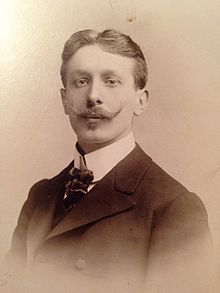Gaston Blanquart
| Gaston Blanquart | |
|---|---|

Gaston Blanquart
|
|
| Born | 21 June 1877 Raismes (Nord) |
| Died | 1 November 1962 (aged 85) Clichy |
| Occupation | Flautist Pedagogue |
| Spouse(s) | Fernande Dauphin |
Gaston Blanquart (2 June 1877 – 1 December 1962) was a French classical flautist as well as a music pegagogue.
Coming from a modest family, Gaston Blanquart began studying the flute at the École nationale de Valenciennes. In 1894 he succeeded the competition of entrance to the Conservatoire de Paris. His teacher Paul Taffanel considered him a model pupil. On July 28, 1898, he went through a jury presided over by Theodore Dubois, including Gabriel Fauré, Gabriel Pierné and Charles-Marie Widor; he then won the First Prize with the famous Fantaisie (Op. 79) by Fauré composed for the occasion.
In 1900 he was hired by Édouard Colonne as fourth flute, and in 1905 became a solo flute of the Concerts Colonne, he held this post for 35 years. The creations in which Gaston Blanquart participated are numerous and of primary importance: Maurice Ravel: Une barque sur l’océan (1907) and the Rhapsodie espagnole (1908), Claude Debussy: Danses for harp (1904), Vincent D’Indy: Jour d’été à la montagne (1906) etc. The greatest soloists performed with the orchestra: Raoul Pugno, Pablo de Sarasate, Alfred Cortot, Pablo Casals, Jacques Thibaud. Occasional conductors were Arthur Nikisch, Richard Strauss, Claude Debussy, Gustav Mahler who directed his second symphony in 1910.
...
Wikipedia
